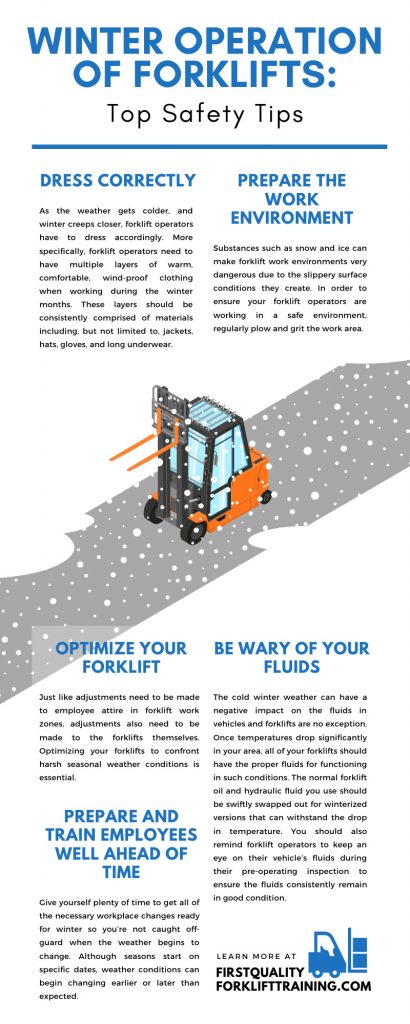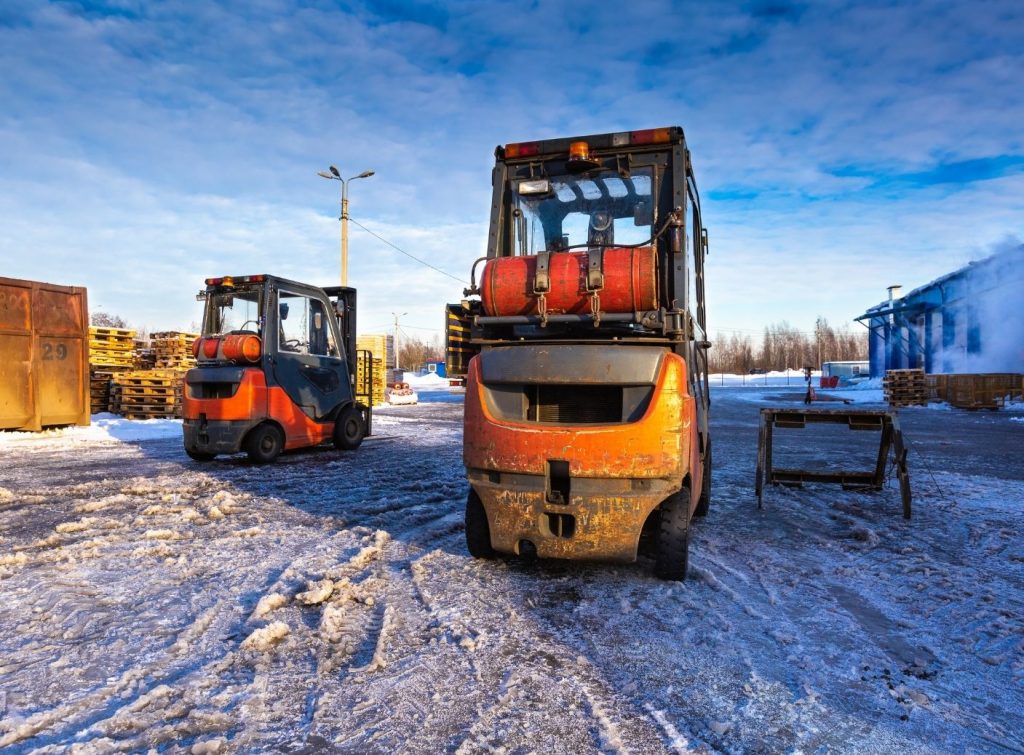Forklift Operator Safety Training
Winter Operation of Forklifts: Top Safety Tips
Forklift safety is an important practice all year round. What some business owners who oversee forklift work environments might not fully understand is how the basic forklift safety guidelines shift between seasons. To help you properly prepare for the cold, harsh winter weather, we’ve put together this essential guide on the subject. When it comes to the winter operation of forklifts, top safety tips like the ones below are necessary for keeping employees out of harm’s way at all times.
Dress Correctly
As the weather gets colder, and winter creeps closer, forklift operators have to dress accordingly. More specifically, forklift operators need to have multiple layers of warm, comfortable, wind-proof clothing when working during the winter months.
These layers should be consistently comprised of materials including, but not limited to, jackets, hats, gloves, and long underwear. With the right winter gear on, forklift operators can avoid frostbite and other injuries/illnesses caused by harsh winter weather conditions.
Aside from dressing to stay warm and healthy, forklift operators should dress to stay visible. The winter weather, especially during snowfall, can hinder the visibility of forklift operators and other passersby in the area. This can throw a big wrench in your work environment since visibility is so crucial to both forklift operators and anyone else nearby.
Poor visibility can lead to forklift collisions, which can yield fatal results. Luckily, an easy way to enhance visibility during the winter is with brightly-colored clothing. By enforcing bright attire in the workplace, you can make it much easier for employees to see each other when completing tasks.
Prepare the Work Environment
Substances such as snow and ice can make forklift work environments very dangerous due to the slippery surface conditions they create. In order to ensure your forklift operators are working in a safe environment, regularly plow and grit the work area. (Although, keep in mind it’s not enough to simply do that once a week.) Instead, both of those actions should occur in the workplace twice a day: during the evening and first thing in the morning.
Gritting and plowing the workplace early in the morning, before your employees even arrive, is a great way to ensure the operators can work their full shift safely, instead of having to clock-in and then wait around for the process to be finished.
Optimize Your Forklift
Just like adjustments need to be made to employee attire in forklift work zones, adjustments also need to be made to the forklifts themselves. Optimizing your forklifts to confront harsh seasonal weather conditions is essential. Not only will it keep the vehicles in good condition, but it’ll also keep the operator inside safe.
First, if your forklifts don’t have enclosed cabins, then upgrade the cabin so it can protect your operators from the elements while they’re working. Aside from regularly gritting and plowing the workplace to help you combat unsafe ground conditions, you should also upgrade the forklift tires to ensure each vehicle has a good grip when an operator is at the helm.
The most effective way of doing this is investing in tire studs or chains. These attachments will grant forklifts with enough traction to maneuver through snowy, icy terrain more safely and efficiently.
Be Wary of Your fluids
The cold winter weather can have a negative impact on the fluids in vehicles and forklifts are no exception. Once temperatures drop significantly in your area, all of your forklifts should have the proper fluids for functioning in such conditions. The normal forklift oil and hydraulic fluid you use should be swiftly swapped out for winterized versions that can withstand the drop in temperature.
The way in which winter weather effects forklift fluids doesn’t just hurt the performance of the machine, it can cause immense damage over time. To avoid enduring mechanical malfunctions and costly repairs, provide forklifts with winterized fluids when necessary.
You should also remind forklift operators to keep an eye on their vehicle’s fluids during their pre-operating inspection to ensure the fluids consistently remain in good condition. To be clear, don’t grab just any winterized fluid. Make sure that the winterized fluid you’re buying is the right fit for the specific climate conditions in your area.
Prepare and Train Employees Well Ahead of Time
Preparing for the above tasks should not be something you do on the first day of winter. Give yourself plenty of time to get all of the necessary workplace changes ready for winter so you’re not caught off-guard when the weather begins to change. Although seasons start on specific dates, weather conditions can begin changing earlier or later than expected.
By preparing for the change well ahead of time, on day one, you can transition into new weather conditions easily. Furthermore, train your employees in advance so they’re just as ready when you are once winter arrives.
Besides the facts above, the most important thing you should train and enforce is safe forklift maneuvering in unsafe winter conditions. Of course, you should already be enforcing a forklift speed limit and other essential safety guidelines for actions such as turning, traveling in reverse, and loading products.
That being said, when winter arrives, the seasonal hazards like icy roads and so forth that come along with it call for even stricter safety guidelines. Train employees for inspecting and maneuvering forklifts through winter conditions so they’re ready to make the necessary changes at a moment’s notice.
In order to ensure the proper winter operation of forklifts, top safety tips like the ones above are crucial to follow each and every year. If you need assistance with training new forklift operators, we’re here to help.
At First Quality Forklift Training, we can provide resources for counterbalance lift truck training, as well as a variety of other OSHA compliant forklift training kits for your employees. Winter can make the workplace different. However, with the right practices in place, from training to equipment upgrades, you can keep the workplace as safe and productive as ever.



